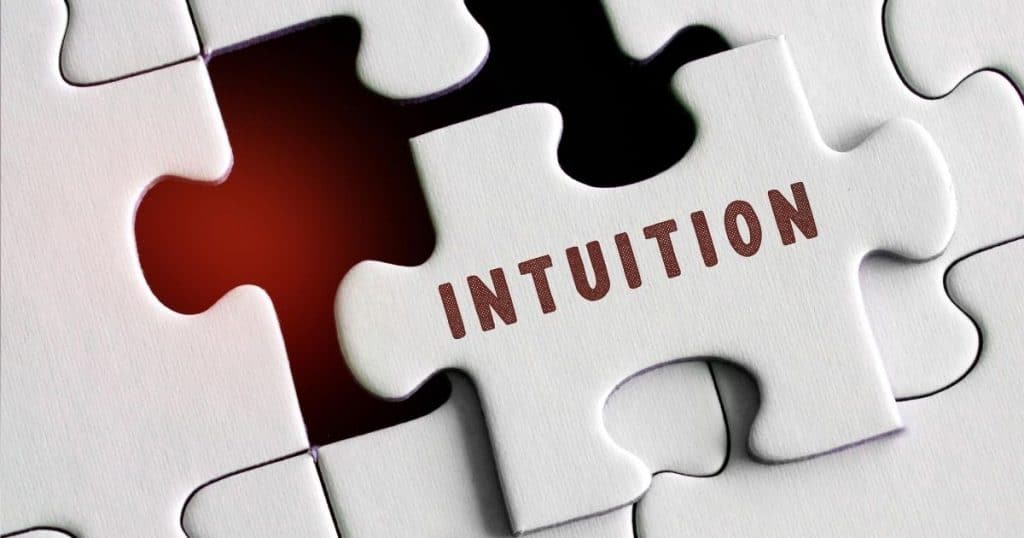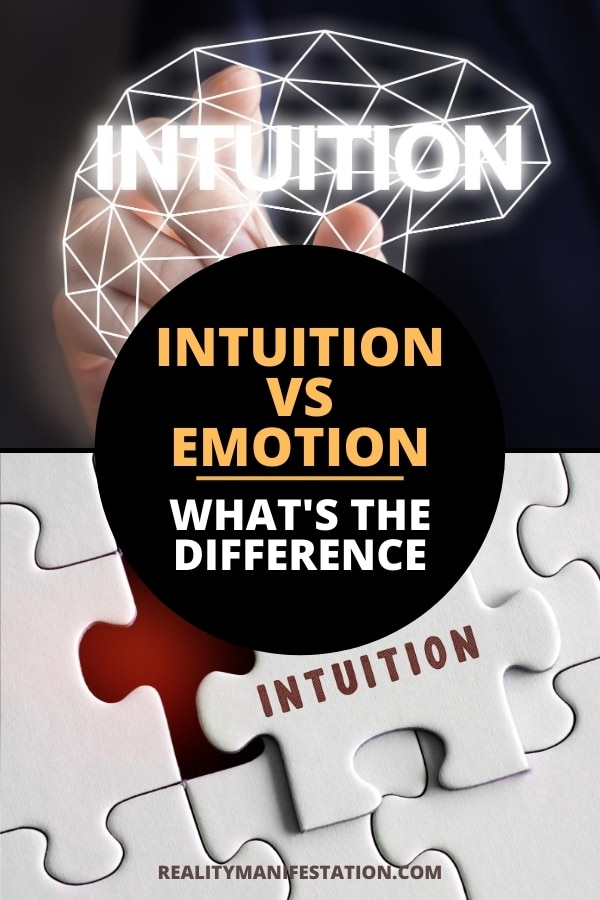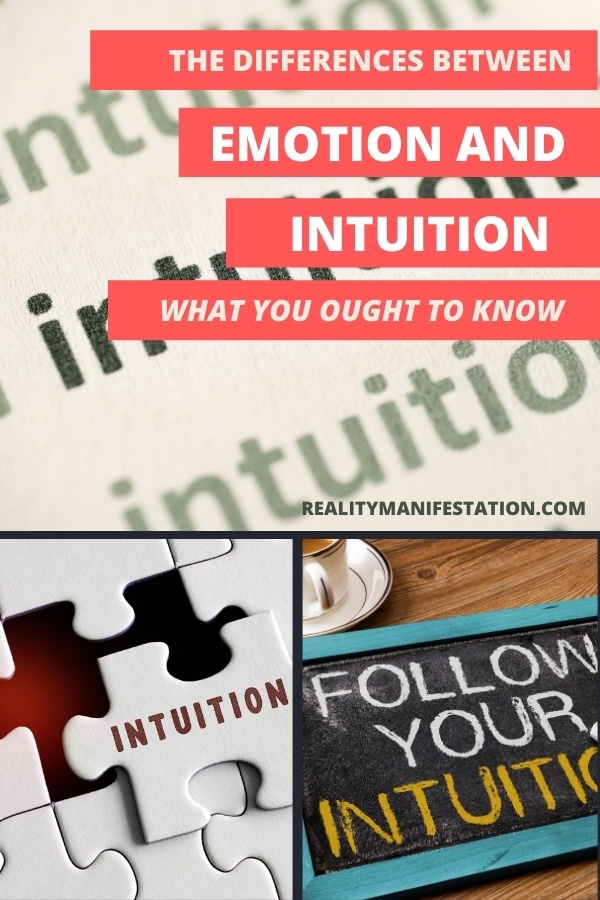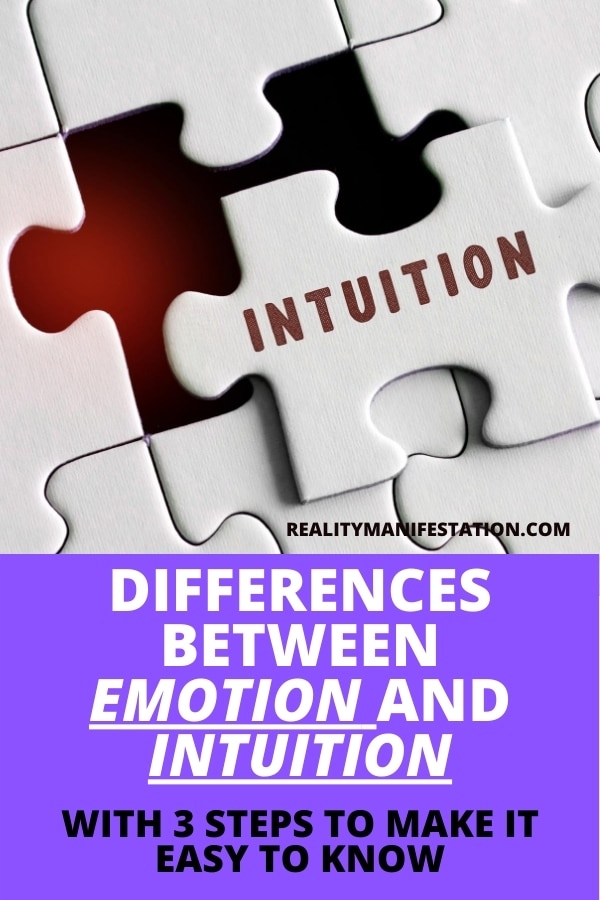The Differences Between Emotion And Intuition What Everybody Ought To Know
So you want to make a decision and you’re concerned with making the wrong decision or you're that frightened you make no decision at all. Not knowing the difference between emotion and intuition makes it more challenging.
Despite the amount you’ve studied you still struggle to know if you’re making a decision based on intuition or if you're being blinded by your emotions.
This post will go through clearly the differences so you can practically start making better decisions and understanding when you’re experiencing an emotion or intuition.
A quick short explanation of the differences between emotions and intuition:
Despite the above statement giving an overview of the differences, continue reading to discover a more in-depth explanation that will allow you to practically apply what you’ve learned for making better decisions.
The Differences between emotions and feelings
Just before further clarifying the differences between emotions and intuition it’s worth getting clear on what feelings are and how emotions differentiate from feelings.
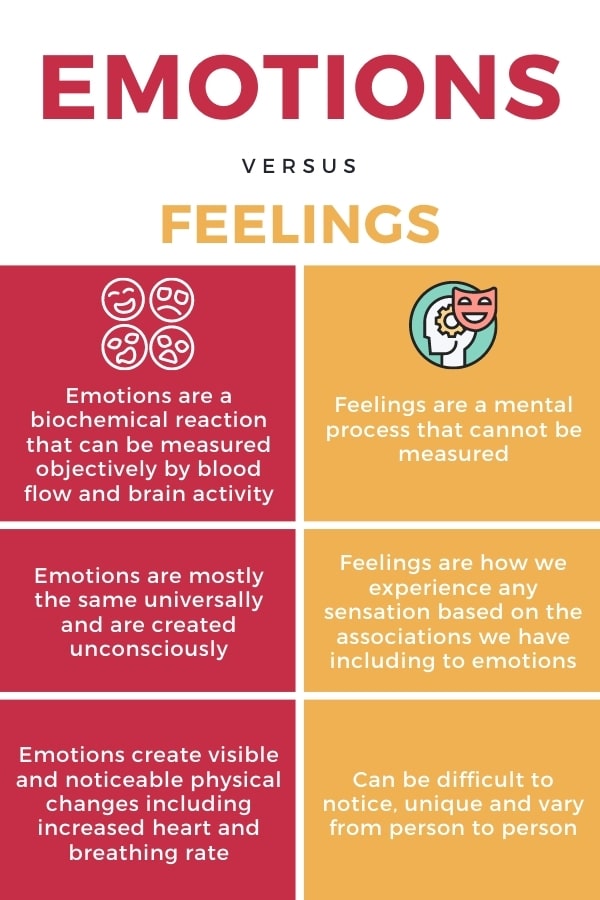
Most of The following ways for describing the differences between an emotion and feelings are based on the views of Antonio Damasio Neuroscientist and professor of psychology, philosophy, and neurology at USC.
What are emotions
According to Antonio emotions are a complex reaction the body has to certain stimuli. This can include our temperature, heart rate, muscles contracting, our mouths becoming dry, etc.
Emotions originate in the body and serve a vital role in our survival for encouraging or discouraging certain behaviours. Emotional reactions occur automatically and unconsciously.
If you can think back to a time when something startled you unexpectedly, your heart rate started to rise, your mouth went dry and your muscles tightened up.
What are feelings
Unlike emotions, feelings don't originate in the body and can't be measured biochemically. Feelings are mental associations to emotions, and other stimuli including, pain, hunger, and the associations to internal and external conditions being processed within our minds.
Regardless of whether what is being processed/imagined is real or not. Unlike emotions, feelings can be changed due to a change in association.
Similar to the previous example, think of a time something startled you but then you felt humorous because the thing that you were frightened of turned out to be something silly like a kitten or someone dressed in a costume.
So even though your body was physically changing due to the emotion of fear. You didn’t feel or experience the emotion the same way because of how your mind perceived the situation.
Clarifying the differences between emotions and feelings
Feelings are mental experiences, emotions are physical states that are usually the response to external stimuli.
Even though Antonio describes emotions are caused by external stimuli.
I would also add that our thoughts can ‘trick’ both the mind and body to think it's experiencing certain stimuli that can cause the body to respond and produce specific emotions.
You can change the emotion/s you’re experiencing but you can’t change an emotion itself because emotions are a set of universal responses. That can be related to being a static state that can be switched on or off within the body as a response to certain stimuli.
After an emotion is produced our personal experience of that emotion is based on the feelings our minds create due to that emotion.
an Analogy that explains the differences between emotions and feelings
Think of an emotion like a fire, it's going to burn regardless of what association you attach to it.
But based on what you do with the fire such as using it to keep yourself warm e.g using the emotion of anger to drive yourself towards making a change.
What you decide in your mind to do with the emotion (the fire) will determine how you feel and experience it.
examples of how feelings differ from emotions
Example 1:
Someone may feel guilty due to emotions that cause pleasant sensations that are designed to make the individual experience feelings of joy and happiness.
But due to a mental association, it also causes the individual to experience feelings of guilt because they may believe they don’t deserve to feel pleasant sensations.
Example 2:
Someone may regularly experience the emotion of sadness but then experience a mental interpretation that also causes them to feel joyful and loved.
Because they associate the emotion of sadness to people caring and taking care of them because they usually receive love and attention when they're sad.
Example 3:
Someone’s body may produce the physiological changes that create the emotion of anger but that same individual may feel scared whenever the emotion of anger is produced.
Because of being concerned that they might hurt someone or get themselves hurt.
Emotion and intuition aren't the same and how to notice the differences
Now that it is clearer what an emotion is and how we feel and experience emotions. I will clarify what intuition is and how to practically use this information when it comes to making decisions.
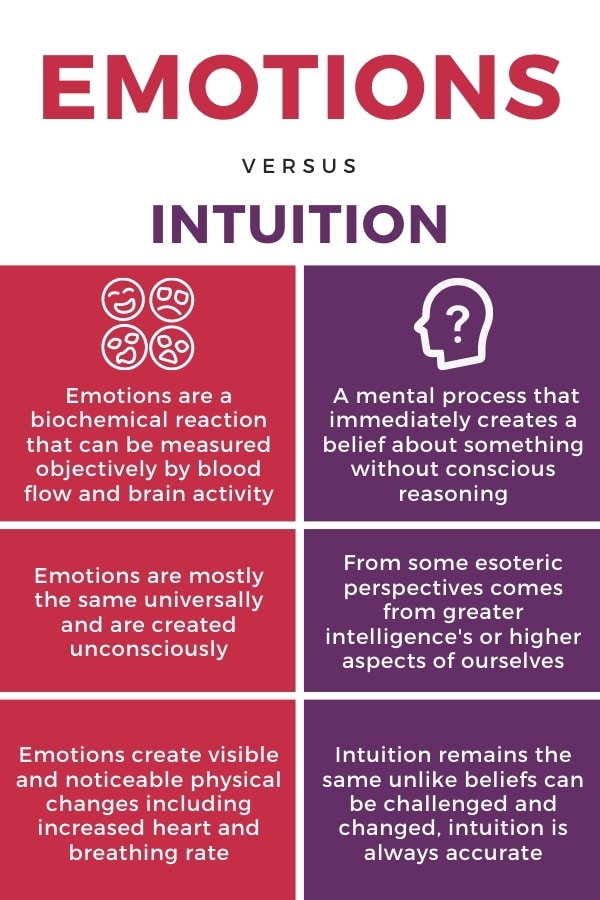
What is intuition according to modern-day mainstream science?
Expanding upon the previous definition of intuition: Intuition is a feeling of unexplainable knowing but without a clear logical explanation as to why the feeling has occurred. Unlike an emotion, it isn’t physical in nature.
An article by the NCBI that references a series of studies has some great and informative definitions for what intuition is within the context of the role of intuition in risk/benefit decision making.
The article describes intuition as a mental process that has been formed as a belief immediately without any awareness of a reasoning process at work.
This basically means that it is a belief or judgement that has been formed immediately without conscious reasoning as to why that belief or judgement was formed.
So according to this information...
Definition for intuition: Intuition is an immediately formed belief that creates a feeling of knowing or a gut feeling that hasn’t been formed by conscious reasoning.
Example of experiencing intuition from a modern psychology world view
You’re introduced to someone at work and you feel an immediate disliking to them and you don’t know why.
This feeling won’t go away at first, but then over time, you start to realize it’s because of their appearance. And some of their behaviour reminded you unconsciously of someone who has betrayed you in the past.
Even though you felt a sense of knowing it turned out to be inaccurate and you ended up becoming close friends.
Discovering they are the opposite of your initial first impression.
What is a belief
To help expand upon the above definition that intuition is basically a quickly formed belief its worth clearly defining what a belief actually is.
A belief is a feeling of certainty for whether something is or isn’t true. The important point here is that it is a feeling. The stronger someone feels something is or isn’t true, the stronger their belief.
A belief can be strengthened by references that confirm the belief is true, such as personal experiences or what people tell you.
Where Does Intuition Come From
The following definitions I’m about to give for intuition I cannot prove even though I can find studies that will show intuition that adds a mystical esoteric flare.
My personal views and beliefs around intuition are based on esoteric teachings and experiences I’ve had and studying many successful people that by following their intuition helped lead them to their success.
The issue is there are aspects of the mind that go beyond what is understood by modern-day science and psychology and the mechanics of how our reality is formed in the first place.
My intention is to provide some explanations so you can practically discover for yourself that intuition isn’t just a mental process in the sense that is currently understood by modern-day mainstream scientists.
And that goes beyond just a feeling of certainty that has been formed due to some mental unconscious process.
Although it is worth being aware of the fact that our biases are one of the main reasons it can be very difficult to know whether what you’re experiencing is intuition or something else.
How intuition is more than just a feeling of certainty
Now that a belief has been clearly defined what differentiates a belief from intuition is that beliefs are formed by mental processes that creates feelings of certainty.
A belief is only as strong as the references that cause the individual to feel certain about something being true.
Unlike intuition, a belief can be changed and cause the individual to feel less certain about the validity of the belief by challenging or having their references for that belief challenged.
Example:
A homeless person might believe all financially rich people are greedy but then see someone rich help them or other people in a selfless manner that challenges their belief.
In comparison, intuition comes from greater and higher intelligence's that we are connected to that cause a feeling of knowing that can feel very similar to a belief.
But unlike a belief intuition cannot be changed or weakened due to experiences or the feeling being challenged.
How to tell the difference between a belief and intuition
It would be great and would make writing this post very easy if I could just simply say do X and you’ll experience Y.
But in reality it can be very difficult without experience and practice of knowing whether what you’re experiencing is a belief or intuition.
And this makes it difficult to do experiments and studies for how accurate intuition is if you’re coming from the world view that intuition is a series of mental processes that are currently understood by modern-day science.
When it comes to making decisions that aren’t immediate this is much easier because you can follow some steps I’m about to go through to help tell whether something is or isn’t a belief.
And having experiences that challenge if what you're experiencing is a belief. Because intuition will remain the same even after being challenged because it isn’t just a feeling of certainty.
An example of experiencing intuition from an esoteric world view
Similar to the previous example you’re introduced to someone, but this time you feel a liking towards them, they are very pleasant towards you and you have a lot in common.
But you also have a different sensation that you just know something isn’t right about them. Which confuses you because everything about them and their behaviour that you’re aware of is telling you different.
You mention this to other people around you and they say its all in your mind and it turns out the individual in this example was only acting pleasantly towards you.
Because the individual was actually planning on stealing your job or something else in their own best interest at the expense of yours.
3 Steps To Know Whether You’re Experiencing Intuition Or An Emotion
The following steps will help you determine whether you’re experiencing intuition or something else.
By now it should already be clear that emotions are physiological responses and that it is your feelings that form your beliefs that can be difficult to differentiate from intuition.
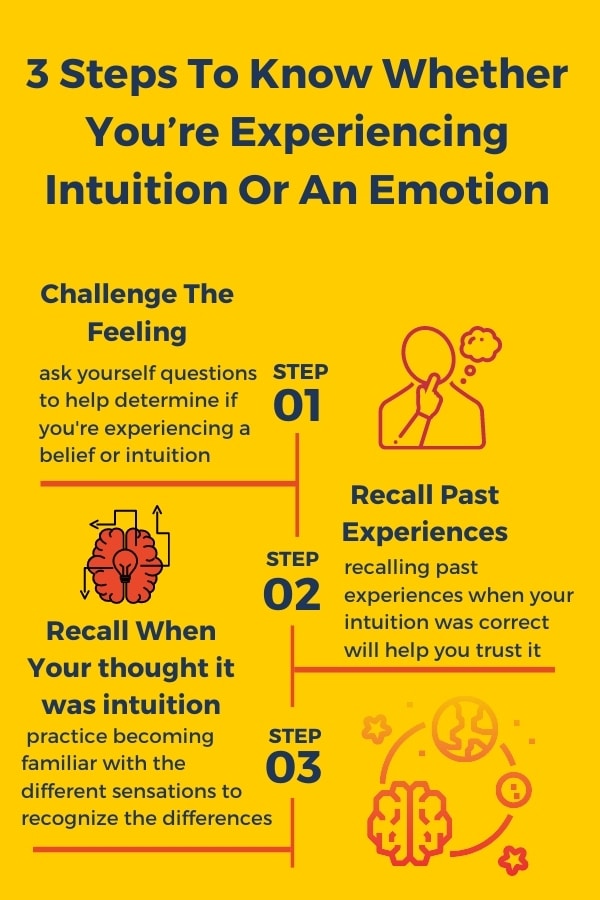
Step 1: Directly challenge the feeling
A great way to challenge beliefs and bring aspects of what's in your unconscious to the surface is through questions.
If you ask yourself questions such as:
1. “Why do I feel this way?”
2. “What could have caused me to feel this way about X”
3. “Do I feel that my feelings towards X may change in the future?”
4. “Am I avoiding following my gut feelings due to fear or doubt?”
Ironically it’s what I like to call lower aspects of our temporary human mind that can cause us to feel fearful and doubt actual intuition so question 4 can help with that.
However, it is important to note these questions aren’t guaranteed to help determine whether something you feel is or isn’t intuition.
Step 2: Think Back To Circumstances and Experiences you’ve had the same feeling before
You’ll likely be able to recall past experiences when you either followed or didn’t follow your intuition and it turned out that your intuition was correct regardless of what decision you made.
Get into the habit of remembering and even journaling when you’ve had intuitive experiences that turned out to be correct because this will help you remember how intuition feels.
Step 3: Think back to when you felt very certain about something incorrectly
Similar to step 2 you’ve likely had many experiences that you felt very certain, reassured about something and it turned out to be incorrect.
By recalling these experiences it will further help you to be able to differentiate an ordinary feeling and intuition. In this context by ordinary, I mean something that isn’t intuition.
The main purpose of these 3 steps is to help you to be able to differentiate intuition from other feelings as intuition is very distinct from other feelings.
But it can be difficult to be able to differentiate from just an ordinary feeling without experience.
How Accurate is Intuition and What To Do Moving Forward
Intuition is always accurate however as previously mentioned it can be difficult to know whether what you feel is intuition.
It’s worth elaborating on what I’ve previously mentioned that the lower aspects of our minds will cause us to want to resist and find reasons why intuition is incorrect.
Because it comes from sources outside of the lower aspects of our minds which can create fear and uncertainty.
Practice following the 3 steps above and it will become easier to differentiate intuition from a feeling.
The fact that you have read this far shows you’re serious for finding answers and by applying these steps, you will be able to start trusting yourself more.
But also remember true intuition comes from aspects beyond the lower ‘ordinary’ aspects of our minds so you also need to be able to trust and let go when you know what you feel is intuition.
I hope you’ve found this blog useful let me know in the comments below if there is anything else you want to know about intuition or if you have any questions.
Summary
- Emotions are a biochemical reaction that can be measured objectively by blood flow and brain activity.
- Unlike emotions, feelings cannot be measured and are a mental process and can arise from how we interpret an emotion.
- In modern-day mainstream science, intuition is typically viewed as a mental process that immediately creates a belief about something without conscious reasoning.
- Intuition from some esoteric perspectives comes from greater intelligence's or higher aspects of ourselves.
- A belief is a feeling of certainty for whether something is or isn’t true and can be challenged and changed.
- Intuition remains the same regardless of whether it is challenged or not.
- To help develop and trust your intuition it is important to remember and become familiar with the experiences you've had when your intuition was correct.

